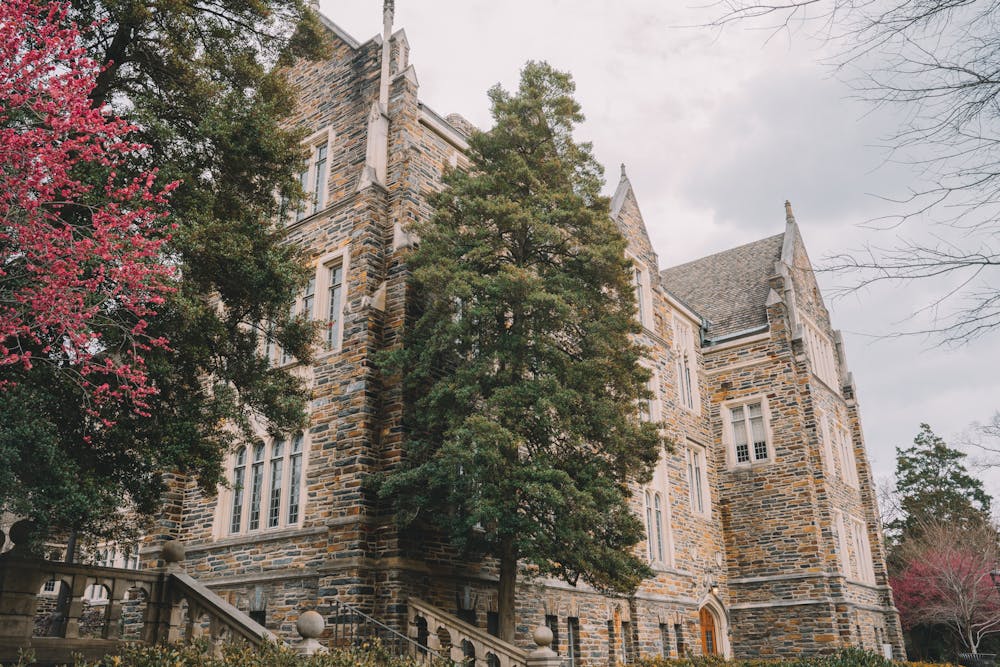Academic Council heard clarifications about Duke’s admissions process and discussed plans to join the Universities Studying Slavery consortium at its Thursday meeting, the first of the 2023-24 academic year.
The meeting is Provost Alec Gallimore’s first with the Council, following the start of his term in July.
Duke’s admissions process
President Vincent Price clarified that there is no official “weight” given to legacy applicants. Instead, the admissions office gives an “extra read” to files for applicants with “a direct alumni relationship.”
Price also discussed changes to Duke’s recruitment practices. Price mentioned that 17% of this year’s entering class is Pell Grant-eligible, echoing his earlier response to a New York Times Magazine article describing Duke as among the “least economically diverse” elite higher education institutions.
Price credits this improvement to new recruitment efforts, such as “aggressive outreach,” “better communication about financial aid policies” and the University’s new financial aid program for students from the Carolinas.
“I won't say that we have yet changed our policies. We have changed our practices, and we’re reviewing our policies,” Price said.
Price also stated that Gallimore would be spearheading a review of overall admissions policies and practices. Gallimore later noted that the June Supreme Court decision overturning affirmative action poses a challenge “in terms of how we’re thinking about shaping our undergraduate class.”
Price further noted that the admissions office directly reports to the provost, rather than the president of the University. He described this practice as a “guardrail” policy to remove undue influence in admissions processes.
“The president is walled off from direct involvement in admissions,” Gallimore said. “As a provost, it is my responsibility to ensure that Duke’s admissions practices are in alignment with our institution’s values and vision.”
Universities Studying Slavery membership
The Council asked why Duke has not joined the Universities Studying Slavery consortium, considering that many of the University’s peer institutions, including Columbia University, Georgetown University, Harvard University, University of Pennsylvania and Yale University, have already joined.
The USS consortium is a collection of colleges and universities committed to “sharing best practices and guiding principles as they engage in truth-telling educational projects focused on human bondage and the legacies of racism in their histories.”
“[Duke has] previously initiated the process to join, and we’re in the final stages of confirming our membership and plan to finalize this fall,” Gallimore said.
Given the university’s history as a Southern institution, joining the consortium is a high priority for Duke, Price said.
“I thought we were a member to be honest, because we initiated this some time ago, but I think it’s really the question of formalizing our membership,” Price said. “We have been, if you will, ‘hanging out’ with them in all of their symposiums since 2017.”
Looking ahead
At the end of the meeting, the Council opened the floor for faculty input on feedback and questions regarding the year ahead.
Several faculty members raised concerns regarding the academic experience of Duke student athletes.
“How can we be excellent in athletics and also be excellent with those student athletes getting a college education?” said Donald Taylor, a professor in the Sanford School of Public Policy who went viral after denying junior and football quarterback Riley Leonard’s request for a homework extension after Duke’s Sept. 4 Clemson win.
Get The Chronicle straight to your inbox
Sign up for our weekly newsletter. Cancel at any time.
These concerns have become particularly salient due to the addition of Stanford and Berkeley to the Atlantic Coast Conference, which Cohen said would have “tremendous implications” for student athletes given their new travel schedules.
The topic of generative artificial intelligence also surfaced, as in recent discussions by the Arts & Sciences Council. Jones shared the Executive Committee’s interest in the potential use of generative AI.
“We’re intrigued about how faculty may be able to lead as we think about some of the possibilities presented by AI and trying to avoid some of the negatives,” she said.
The council then transitioned to discussing the changing landscape of higher education. Jones noted both “restrictions on tenure and the teaching of systemic discrimination” as topics for the Academic Council to prepare potential responses to.
In other business
During the meeting, Jones recognized the passing of Craig Henriquez, associate vice provost for faculty advancement and professor of biomedical engineering. Hernandez was a longtime faculty member and previous chair of the Council.
The Council also approved new members to its Faculty Hearing Committee.
Ryan Kilgallen is a Trinity sophomore and an associate news editor for the news department.
Alice Qin is a Trinity senior and opinion editor of The Chronicle's 120th volume.

